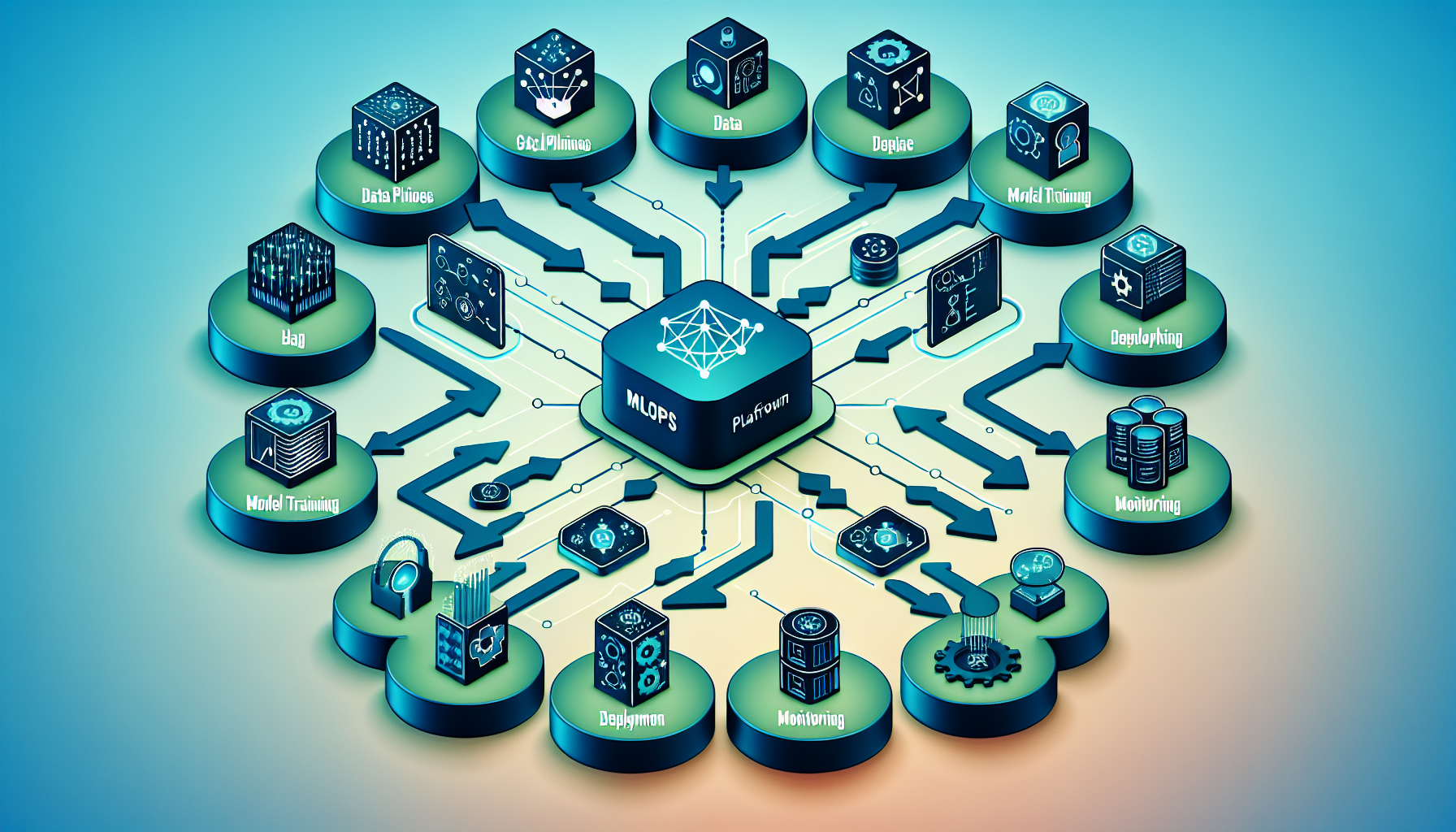Artificial Intelligence (AI) fundamentally improves software scalability, allowing systems to dynamically grow and adapt. Cloud infrastructure plays a crucial role in supporting these scalable AI systems. This article delves into the impact of AI on software scalability: building future-proof systems, and offering strategies to integrate AI effectively. Utilizing your own data is crucial for customizing and personalizing AI models, similar to how enterprises partner with Scale AI to train custom models using their unique datasets.
Key Takeaways
- Successful scaling of AI systems requires a combination of advanced technology, effective resource management, strong data governance, and high data quality to ensure accuracy and reliability.
- Implementing MLOps platforms facilitates seamless AI operations by automating processes, enhancing collaboration, and supporting continuous model updates.
- Investing in robust infrastructure, predictive analytics, and collaborative teams is essential for organizations to proactively manage scalability and optimize performance amid fluctuating demands.
- Utilizing own data for training custom AI models ensures personalized solutions and enhances the effectiveness of AI deployments.
Understanding AI and Software Scalability

AI scaling is the ability of AI services to grow and adapt compute resources to meet business needs, including the ability to scale down when necessary. This dynamic capability is crucial for businesses that experience fluctuating workloads and seek to optimize resource utilization. The scalability of an AI system is largely determined by its speed and accuracy in business operations, allowing it to transcend beyond a mere proof-of-concept stage to full-scale deployment.
Scaling AI involves more than just building sophisticated models; it requires bringing these models into production-grade applications that can run at scale while ensuring effective monitoring and reporting. Utilizing own data can significantly enhance the customization and effectiveness of AI models, as it allows enterprises to train custom models using their unique datasets. This process demands significant investment, commitment, new skills, and technologies, along with the necessary computing power and operational adjustments. Organizations must navigate both technical and cultural challenges to successfully implement and scale AI.
The benefits of effectively scaling AI are manifold. Companies that have mastered this art report higher customer satisfaction, improved workforce productivity, and more efficient asset usage. Scalable AI systems must be supported by appropriate infrastructure and sufficient data volumes to ensure models and algorithms operate efficiently and meet required speeds.
The Role of Machine Learning Algorithms in Enhancing Scalability
Machine learning algorithms play a pivotal role in enhancing operational efficiency and significantly reducing errors. These algorithms enable businesses to scale AI effectively by optimizing processes and improving accuracy. One critical aspect of this is proper feature scaling, which ensures different data attributes contribute equally during machine learning model training. Utilizing own data is crucial for training machine learning algorithms tailored to specific business needs, enhancing customization and personalization. This balance is essential for maintaining the integrity and performance of the models.
Efficient resource management is another key factor, facilitated by specialized AI hardware such as GPUs for parallel processing, TPUs for specific workloads, and FPGAs for flexibility. These technologies help manage the extensive computational demands of AI, ensuring that systems can scale seamlessly. The journey to scaling AI often starts with data science, where data scientists tailor machine learning algorithms to the specific needs of the business.
The advantage of leveraging these advanced algorithms lies in their ability to optimize resource allocation and improve decision-making speed and accuracy. This drives operational efficiency, enabling enterprises to scale their AI initiatives effectively and sustainably.
Leveraging Generative AI for Scalable Solutions

Generative AI, with its ability to adapt from handling straightforward tasks to forming complex organizational strategies, represents a significant leap in addressing increasing demands. This adaptability makes generative AI an invaluable tool for enterprises looking to scale their operations. The effectiveness of machine learning algorithms at scale often hinges on their computational complexity and their design to process large datasets efficiently.
Starting with small, manageable tasks can help in effectively adopting generative AI. This approach allows leaders to witness immediate benefits and build confidence before expanding its application. As these generative models prove their worth in smaller projects, they can be scaled to tackle more complex challenges, thereby optimizing processes and delivering substantial gains to the organization through large language models. Utilizing own data to train these generative models can further enhance their performance, providing more personalized and effective solutions.
The benefits of leveraging generative AI are clear: increased efficiency, enhanced decision-making, and the ability to meet growing service demands without compromising on quality. This approach not only drives scalability but also positions enterprises to harness the full potential of AI technologies.
Integrating MLOps Platforms for Seamless Scaling

Machine Learning Operations (MLOps) is a discipline dedicated to managing and scaling AI operations effectively. Automation through MLOps platforms streamlines AI processes, enhancing model deployment efficiency and ensuring seamless updates. Leveraging own data within MLOps platforms can further enhance model deployment and updates by utilizing unique datasets for customization and personalization. This level of automation is crucial for maintaining operational efficiency and delivering consistent service quality.
MLOps platforms excel in automating incident management, swiftly addressing issues and enhancing overall service delivery. Furthermore, ongoing integration and deployment capabilities within this MLOps platform allow for continuous updates to machine learning models, ensuring they remain relevant and effective. MLOps tools also enable effective collaboration among data scientists and IT teams, which is essential for accelerating innovation and decision-making.
Integrating MLOps platforms allows organizations to scale AI initiatives efficiently, adapt quickly to expanding requirements, and maintain operational flexibility. This integration is the bedrock of a robust and scalable AI infrastructure.
Data Governance: Ensuring Success in Scalable AI Systems
Data governance is crucial for the success of scalable AI systems. Implementing comprehensive data strategies and utilizing appropriate tools are critical steps in this process. AI data governance establishes a structured approach for managing data, ensuring compliance with legal and ethical standards throughout the deployment of AI systems. Utilizing own data in this context ensures effective data governance and compliance, as it allows for customization and personalization in deploying AI technologies. This structured approach enhances data quality, prevents biases, and enables AI systems to deliver accurate and reliable insights.
Automating compliance checks and data classification within the AI governance framework boosts operational efficiency and minimizes non-compliance risks. High-quality, clean data is a cornerstone of effective AI performance and decision-making. Organizations must assess their existing data practices and define clear data quality goals to ensure successful implementation.
Moreover, a robust compliance framework is necessary for managing AI data, helping maintain security and avoid issues such as data leaks. Bias and fairness in AI systems are critical issues that require diverse data and responsible development practices. Data governance strategies should be adaptable to future technological changes and organizational growth.
Predictive Analytics for Proactive Scalability Management
Predictive analytics, enhanced by AI, allows businesses to foresee potential issues and optimize resource allocation, thereby improving scalability. Utilizing their own data can significantly enhance the accuracy of predictive analytics models, leading to more precise forecasts. AI can forecast future resource needs based on historical usage trends, helping businesses manage resources more effectively. This proactive approach ensures that companies can maintain application performance even during demand fluctuations.
Continuous monitoring of AI models is vital to ensure they remain relevant and effective over time. By minimizing unplanned downtime through early failure detection, predictive analytics enhances operational reliability and builds customer trust. The ability to dynamically scale resources based on predictive analytics helps maintain consistent performance and efficiency.
This proactive management of resources not only supports scalability but also drives operational excellence to ensure success, allowing businesses to stay competitive in a rapidly evolving market.
Building Robust Infrastructure for Scalable AI

Building a robust infrastructure is fundamental to supporting scalable AI. Cloud computing infrastructure often utilizes powerful GPUs and TPUs to manage extensive datasets and complex AI computations. Memory systems are critical for allowing rapid data access and storage during these computational tasks. Efficient cooling systems are necessary to prevent overheating and ensure optimal performance during intensive AI operations.
Utilizing own data can optimize infrastructure for scalable AI by enabling enterprises to adopt and train custom models using their unique datasets. Accurate capacity planning, made possible by predictive analytics, ensures that cloud infrastructure can scale to meet future demands. Incremental learning allows machine learning models to update continuously without needing to retrain from scratch, which is vital for scalability.
Predictive maintenance driven by AI insights helps reduce operational costs by preventing unexpected infrastructure failures. Investing in a robust infrastructure ensures that AI services can scale efficiently, meeting the growing demands of the business world.
Creating Collaborative AI Teams for Effective Scaling
Creating collaborative AI teams is crucial for the effective scaling of AI initiatives. A multidisciplinary team, including stakeholders and advocates from various departments, is essential for the successful implementation of AI. These teams should include data scientists, IT engineers, and businesspeople working together to achieve common goals. Utilizing their own data can facilitate better collaboration among AI teams by enabling more personalized and effective model training.
Organizations often face challenges in scaling teams, processes, and tools in an integrated manner. The right tools for AI scaling facilitate collaboration, helping these diverse teams work together seamlessly. Clear communication and training are key to overcoming cultural resistance within organizations.
By fostering a collaborative environment, enterprises can leverage the full power of their AI teams, driving innovation and achieving scalability more effectively.
Case Studies: Successful Implementation of Scalable AI Systems
Real-world examples provide valuable insights into the potential of scalable AI systems. Enel X’s AI platform has significantly improved energy efficiency across its operations, reducing waste. Siemens’s Digital Enterprise Suite has led to increased productivity and reduced downtime in manufacturing. UPS’s ORION platform drastically cut down driving distances, resulting in considerable cost savings.
JPMorgan Chase’s AI assistant, COiN, has streamlined back-office tasks, improving efficiency and compliance. Coca-Cola enhanced its advertising ROI significantly by using the AI platform, Albert, for campaign optimization. Blue River Technology’s See & Spray system has optimized herbicide use while boosting crop yields. A notable case study is Scale AI partnering with enterprises to adopt and train custom models using their own data, which has enhanced AI scalability and personalization.
KLM’s AI chatbot, BlueBot, effectively resolved around 60% of customer queries autonomously. These case studies showcase the transformative power of scalable AI systems, providing lessons on scalability and operational efficiency that can be applied across various industries.
Future Trends in AI and Software Scalability

The future of AI and software scalability is filled with exciting possibilities. Research indicates that the economic impact of Generative AI could contribute trillions to global economic value through various applications. AI is increasingly being utilized to create innovative content across various artistic fields, such as music and film. The rise of AI-driven autonomous vehicles is expected to enhance safety and efficiency in transportation.
Multimodal AI, which integrates different types of data inputs, promises to improve interactions and decision-making. Utilizing own data for more personalized and effective AI solutions will be a significant trend, helping enterprises adopt and train custom models using their unique datasets. These trends underscore AI’s growing role in shaping the future of technology and business operations, particularly in the context of digital transformation. As AI continues to evolve, so too will the strategies for scaling these systems to meet the demands of an ever-changing world.
Summary
Summing up, the integration of AI in software scalability is a multifaceted endeavor that requires careful planning and execution. From understanding the basics of AI scaling to leveraging advanced machine learning algorithms and MLOps platforms, businesses can build robust, scalable systems that meet the demands of the future. Utilizing their own data in partnership with platforms like Scale AI helps enterprises adopt and train custom models, enhancing both scalability and personalization. Effective data governance, predictive analytics, and collaborative AI teams further enhance the scalability and operational efficiency of these systems.
As we look to the future, the potential of AI to transform industries and drive economic growth is immense. Embracing these technologies and strategies today will enable organizations to stay competitive and innovative in the years to come.
Frequently Asked Questions
What is AI scaling?
AI scaling is the capability of AI services to dynamically adjust compute resources to align with business demands, allowing for both expansion and contraction as needed. This adaptability is crucial for optimizing performance and cost efficiency.
How do machine learning algorithms enhance scalability?
Machine learning algorithms enhance scalability by incorporating feature scaling, boosting operational efficiency and optimizing resource allocation, which ultimately leads to better performance and reduced errors. This capability allows organizations to handle larger datasets and increased workloads effectively.
What is the role of MLOps platforms in scaling AI?
MLOps platforms are crucial for scaling AI as they automate processes, enhance model deployment efficiency, and incorporate incident management to foster collaboration between data scientists and IT teams. This ensures smooth operations and effective growth in AI initiatives.
Why is data governance important for scalable AI systems?
Data governance is crucial for scalable AI systems as it ensures compliance checks with legal and ethical standards, enhances data quality, and prevents biases, ultimately leading to more accurate insights.
What future trends in AI and software scalability should we watch for?
Watch for trends such as the economic impact of Generative AI, advancements in AI-driven content creation, the rise of autonomous vehicles, and the evolution of multimodal AI, as these will significantly enhance interactions and decision-making in various sectors.
About InTech Ideas
If you’re looking to elevate your tech strategy and drive business growth, InTech Ideas is here to help. We offer a comprehensive suite of services, including Software Development Teams, Product Development Fast Track, and Product Leadership & Advisory. Whether you need to scale your development team, fast-track your product, or bring in expert leadership, we provide tailored, people-first solutions that align with your company’s goals. Learn more about how we can support your journey by exploring our services or contacting us today to discuss your specific needs.

